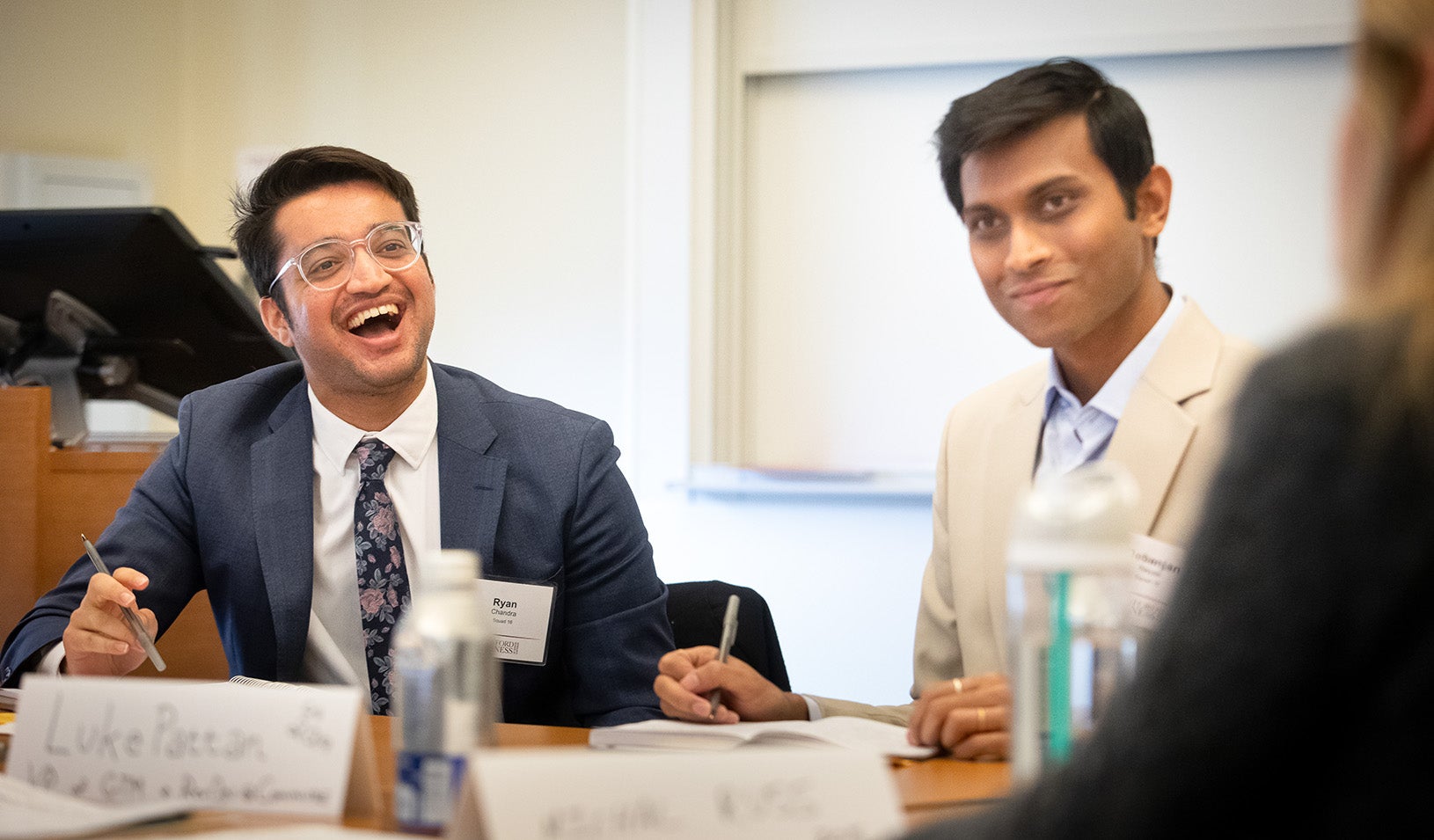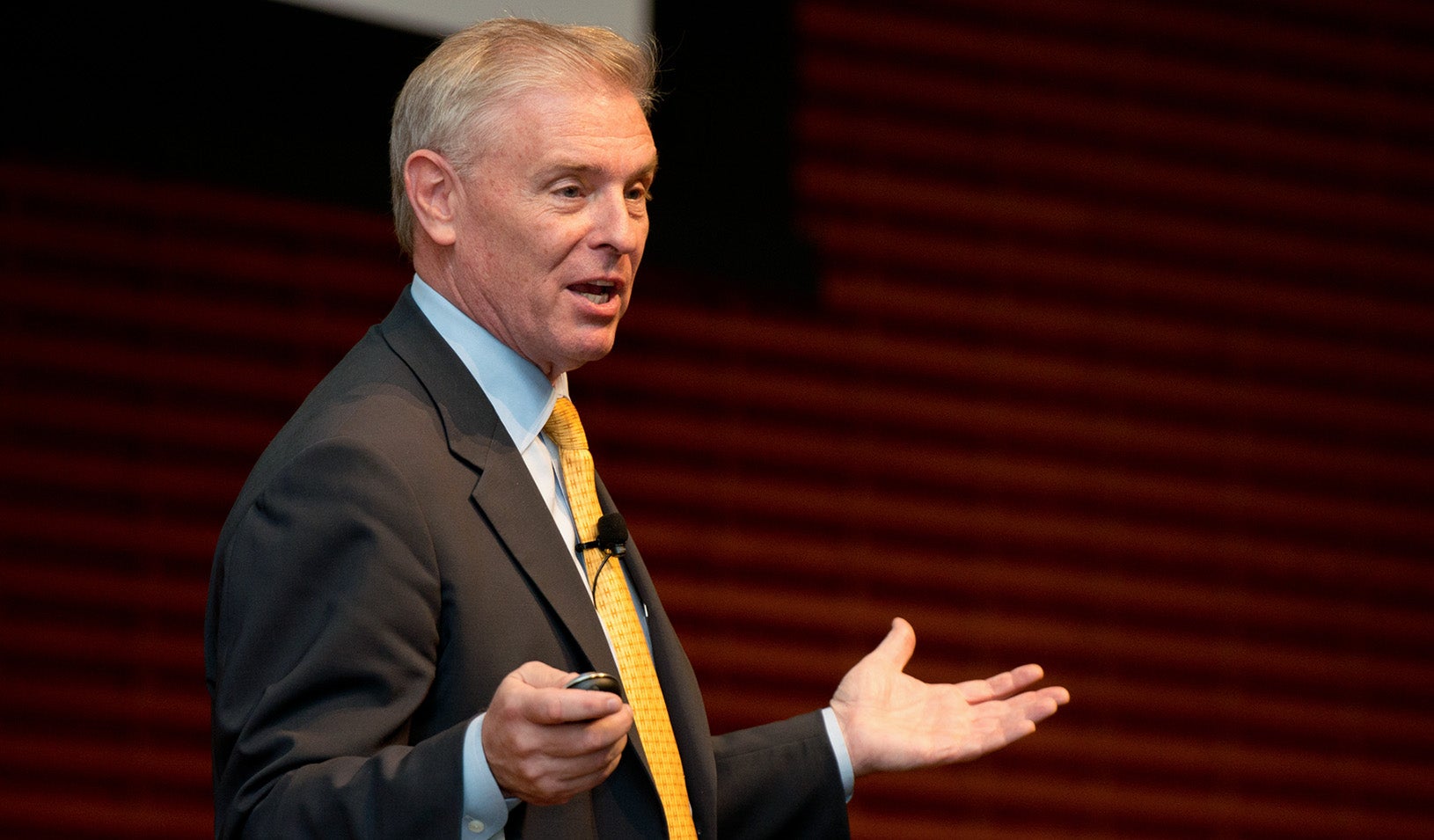December 17, 2011
“Bigger! Faster! Stronger! Smarter than before!”
With that rallying cry, nearly 400 scrubbed and suited MBA students left the Schwab Residential Center on Dec. 7 and strode more or less confidently across the street to the Knight Management Center. The occasion was the sixth annual Executive Challenge, an intensive day-long business simulation designed to test the first-year business students’ budding leadership skills.

Jennifer Silver, MBA ‘81, right, gives feedback to two first-year MBA students at the conclusion of their role-playing exercise.
On hand to greet them were more than 200 volunteer alumni judges, many of them seasoned presidents, partners, and C-level executives who had taken days off work and traveled long distances to be there. Dean Garth Saloner marveled at the size of this year’s turnout. “This is the community in action,” he observed proudly in his opening remarks, addressing the judges gathered in CEMEX Auditorium. “Our alumni are coming back to support what we’re doing academically … The students have looked forward to it all quarter. They’re anxious, keen, eager, nervous, the whole mix. It’s become an iconic event.”
Jim Phills, professor of organizational behavior (teaching) and one of the organizers of the day-long program, agreed. “You are the crucible,” he told the assembled judges. “We are going to throw the students in to you, and they are going to come out transformed — stronger, faster, and smarter. They will be the better for their experience.”
Stanford GSB began staging the Executive Challenge in 2007 as part of a major overhaul of its MBA curriculum. Among the changes was a new cornerstone course called Strategic Leadership, which immersed students from the get-go in realistic workplace simulations. The approach, Saloner said, “was predicated on the fact that you learn by doing as opposed to being lectured at from the front of the hall.”
In this year’s exercise, six-student squads — each mentored by a second-year MBA student — were presented with three fictitious business scenarios. One involved a potentially valuable but risky business acquisition, another dealt with product-performance issues, and the third involved an unruly management team. Within the space of an hour, the squads had divided into three groups of two, with each pair quickly studying and presenting one of the cases.
As the first round commenced, MBA ‘13 classmates Katie Weisner and Dan Stanko launched into their assigned roles as chairman and CEO of the company that was considering an acquisition. Their goal was to convince four skeptical alumni “board members” that the deal was sound. Observing from the back of room C110 were their Squad 20 teammates and 1 leadership fellow, a communications coach charged with giving feedback on matters such as body language and vocalization, and additional alumni judges charged with grading the general presentation.
Despite some spirited theatricality on the part of the judges — “I’m concerned that we’re overpaying,” one fictitious board member warned while another said flatly, “We should stay out of it!” — Weisner left the room confident that she and her partner had made their points. “I definitely thought it was a worthwhile experience,” she said later. “The feedback we got was just the right mix of encouragement and really pointed actionable advice.”
Not far away, first-year students Ammanuel Zegeye and Vivek Viswanathan were playing out their roles as the CEO and CTO of a company whose new product was falling short of expectations. They needed to reach consensus with their directors about what course of action to take — and it wasn’t pretty. Afterwards one of the judges advised Zegeye, who has an English accent, to speak more slowly. “We had a lot of conflict with the board,” he acknowledged, “but in general I think Vivek and I really complimented each other and worked well together.”
For Jimmy Zhou, MBA ‘13, of China, the role-playing exercise provided a useful lesson in American corporate politics. He, too, worked on the acquisition case, playing the role of chairman of the board. “I walked into the room in full support of my CEO, but after our presentation one of the judges said to me, ‘If you are the chairman, you usually keep a distance from the CEO; you need to step back a little bit.’ That’s one thing that really struck me. I didn’t realize that.” The event, he added, “was the highlight of my whole semester.”
First-year students weren’t the only ones who found the elaborate role-playing exercise worthwhile. “I find it fascinating to engage with the students. It reminds me of the thrills and spills when I was going through similar issues,” said volunteer judge Robin Richards Donohoe, MBA ‘94, managing director of the San Francisco-based Draper Richards Kaplan Foundation. “It’s energizing to be around all these great students. You remember how pivotal business school was in your own life.”
Dave Whorton, MBA ‘97, founding partner of Tugboat Ventures in Palo Alto, said he enjoys the day so much that he’s been coming back to judge for the past three years. “I was skeptical at first and figured it would be fairly routine, maybe something I’d do once. But I was so impressed watching the students quickly understand the material, and very quickly present themselves in a stressful situation. It’s hard to divine people’s character. To see how they behave under stress is very powerful.”
Like many alumni judges, Whorton has found the Executive Challenge to be a good opportunity to network as well. Each year he picks at least two students from the squads he has judged and schedules lunch with them. “One is now coming into my office regularly on weekends and brainstorming business ideas,” he said. “These students demonstrate such strong leadership capability, I want to see them succeed.”
This year’s Executive Challenge served as the final fall quarter exercise for the Business School’s Strategic Leadership course. Teams that received the highest scores from judges were recognized at the end of the day, but Phills declined to bill the exercise as a competition. “This day is really about getting the most out of a transformative learning experience — and, on that score, everyone here is a winner,” he said.
By Theresa Johnston
For media inquiries, visit the Newsroom.



